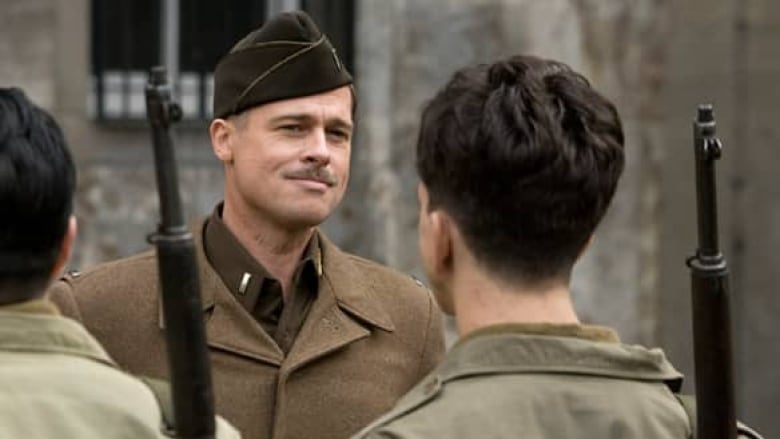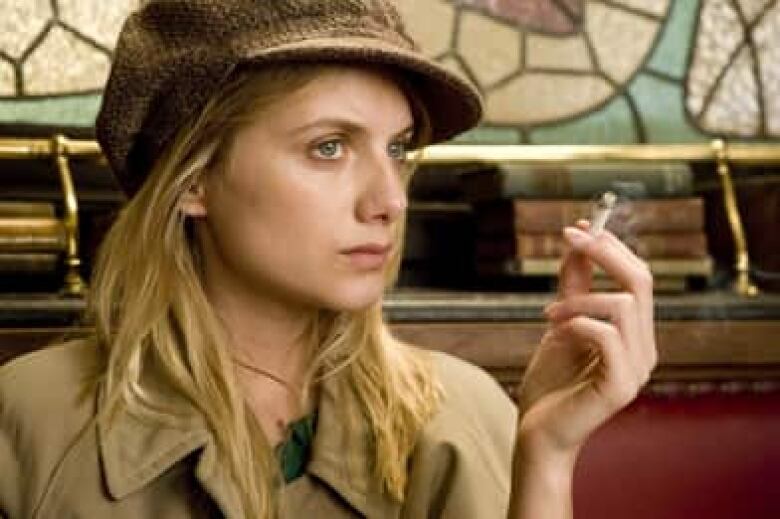Inglourious Basterds
Quentin Tarantino's tragicomic Second World War revenge drama is blunt, visceral and exciting

There's a scene in Quentin Tarantino's Inglourious Basterds in which Brad Pitt, speaking in a Southern accent from the corner of a mouth as gnarled as Popeye's, says: "Ah think this might be my masterpiece." Pitt's character is carving a swastika into a man's forehead at the time, and the line is clearly a declaration of sorts from the writer-director, delivered with equal parts irony and defiance: My masterpiece does gore. What of it?
Like a swastika on the forehead, Inglourious Basterds is blunt and literal. Brute force is the film's mode of delivery and it calls evil as it sees it.
Like a swastika on the forehead, Inglourious Basterds is blunt and literal. Brute force is the film's mode of delivery and artistry and it calls evil as it sees it. This unequivocating attitude is oddly refreshing (and sure to offend) after decades of hand-wringing in film criticism and academia over how to depict the un-depictable atrocities of the Holocaust. Tarantino has his own solution, bred in the grindhouse: blow 'em all to hell.
Inglourious Basterds unfolds over five chapters, opening with "Once Upon a Time in Nazi Occupied France." That title's comic-tragic juxtaposition of fairy tale and the realest of real history is the film's engine. This first, lingering chapter takes place in a farmhouse in France where German Col. Landa (Christoph Waltz, thief of scene and movie), chilling with sugary insincerity, is living up to his moniker "the Jew-hunter." The scene between the German invader and the French farmer is slow and tense, filled with undulating power shifts and moments of macabre hilarity. All of it is, of course, a precursor to explosive and appalling violence, a filmic GPS that announces your arrival at a Tarantino film. The director is at his slow-boiling best here, backed by a spaghetti western soundtrack that underlines the mood of isolation and siege.
The Jews are indeed hunted, but one escapes. Beautiful Shoshanna (Melanie Laurent) appears in the next chapter, grown and living in Paris, running a cinema under an assumed gentile identity. She's being pursued by Frederick Zoller (Daniel Bruhl), a young German sniper enjoying his 15 minutes of fame for killing dozens of Allied soldiers he proudly calls himself a German "Sgt. York."

Zoller's war-hero celebrity has made him both subject and star of a new propaganda film called Nation's Pride (the film-within-the-film is directed by Eli Roth, who co-stars in Inglourious Basterds). As part of his unsuccessful campaign to win Shoshanna (those offspring of the murdered always play hard to get!), Zoller persuades the German brass to premiere the movie at her theatre. The guest list is a who's-who of Teutonic monstrosity, and includes Hermann Goring and Joseph Goebbels, who fancies himself a David O. Selznick type. Even Hitler might clear his schedule to make it.
One of the most common criticisms of Tarantino's deliberately lowbrow, bare-knuckled aesthetic glory is: So? What is this rockin' celluloid action in service of, anyway? All that film-geek fawning and winking is fun, but the weakest of Tarantino's films end up a kind of ouroboros of cool, an endless circle of hip eating itself.
If Tarantino believes in anything, it's in movies, and the power of movies to transform. (We know that they transformed his own life: the former video store clerk had "lifelong basement dweller" carved on his own forehead before Reservoir Dogs.) This faith in film is taken to its logical and literal extension in Inglourious Basterds. Shoshanna's plan is to get the Germans in their seats, lock the doors and set fire to a massive pile of flammable nitrate film, annihilating the bunch of them. Who says movies can't have political impact?
So good is this plan poor, thwarted Tom Cruise in Valkyrie should have thought of it that at least two other groups come up with something similar. Pitt is Lt. Aldo Raine, the Tennessee-reared head of a commando unit of self-styled Nazi hunters who call themselves the Inglourious Basterds, a misspelled allusion to a little-seen 1978 Italian film. (Does all that winking ever make Tarantino's eye tired?) All Raine wants from his team of Jewish fighters is 100 Nazi scalps each, and they are happy to oblige, in revolting close-up.
This faux Dirty Dozen segment is the film's least imaginative and most self-satisfied. It's also not very funny, though Pitt's cartoonish performance suggests we should be keeled over in laughter, not scalping-induced nausea. I can only imagine what kind of late-night, red-eyed, high-fiving bro-fest led Pitt and Tarantino to agree that the latter should play Raine with Bell's Palsy facial paralysis and Foghorn Leghorn intonation. As an actor, Pitt relishes the opportunity to go broad, most recently with greater success as the gum-chewing gymbo in the Coen Brothers' Burn After Reading. But sometimes, Mr. Pitt, more is less.
The Basterds are set to rendezvous with a British agent (a wonderful Michael Fassbender, from Hunger) and a German double agent, a movie star named Bridget Von Hammersmark (Diane Kruger). A plan to complete the plan at a meeting in a bar turns sour when a group of drunken German soldiers begin accosting the actress, and the spies come up against a suspicious Gestapo officer (August Diehl, one of many great faces that Tarantino collects here).
Tarantino, the ultimate referencer, is now in the odd position of referencing himself, and being referenced in every second action movie. In other words, the pop violence those witticisms speckled with blood that looked so revelatory and new less than 20 years ago seems almost predictable today. But in Inglourious Basterds, Tarantino shows that he still does it best. After an excess of chatter, the bar scene turns into a dazzlingly choreographed, explosive confrontation, including another of his signature Mexican stand-offs gun on gun on gun, etc. (Yes, he borrowed it from Sergio Leone, but he never gave it back.) Shoshanna's moment of revelation arrives to the tune of David Bowie's Putting Out Fire and the anachronism is exultant.

Still, this is not Tarantino's masterpiece. More than a few jokes are crude and adolescent and weirdly unfunny a jump-cut to Goebbels's translator in a compromising position, meant to be outrageous, was met with total silence in the theatre. The tone is weakest when it is an off-puttingly giggly imitation of Dr. Strangelove. Mike Myers under latex as a British agent has Austin Powers connotations, fairly or not, and Hitler (Martin Wuttke) is too comic, all flop-sweat and fist-thumping. Much warmer and unique is the Shoshanna storyline, where Tarantino seems to be feeling out a slightly new mode of storytelling, one with room to breathe between punches. (He has always done well by his women warriors.)
It's exciting to see him venturing ever so slightly towards something political, even if Nazis aren't exactly divisive bad guys. It's not surprising that his career-long fascination with evil would take Tarantino to this subject matter. Though he invokes several awkward references to Austro-German cinephilia G.W. Pabst, Leni Riefenstahl it's Tarantino's optimistic, quintessentially American outlook that drives him to the film's breathtaking finale. There, Tarantino rewrites the darkest past via a glowing, glorious cowboy fantasia. It is a moment of pure and explosive myth that, for better or worse, forces history to bow down to the director's own religion, his sole culture: movies.
Inglourious Basterds opens Aug. 21.
Katrina Onstad is the film columnist for CBCNews.ca.












_(720p).jpg)


 OFFICIAL HD MUSIC VIDEO.jpg)
.jpg)



























































































